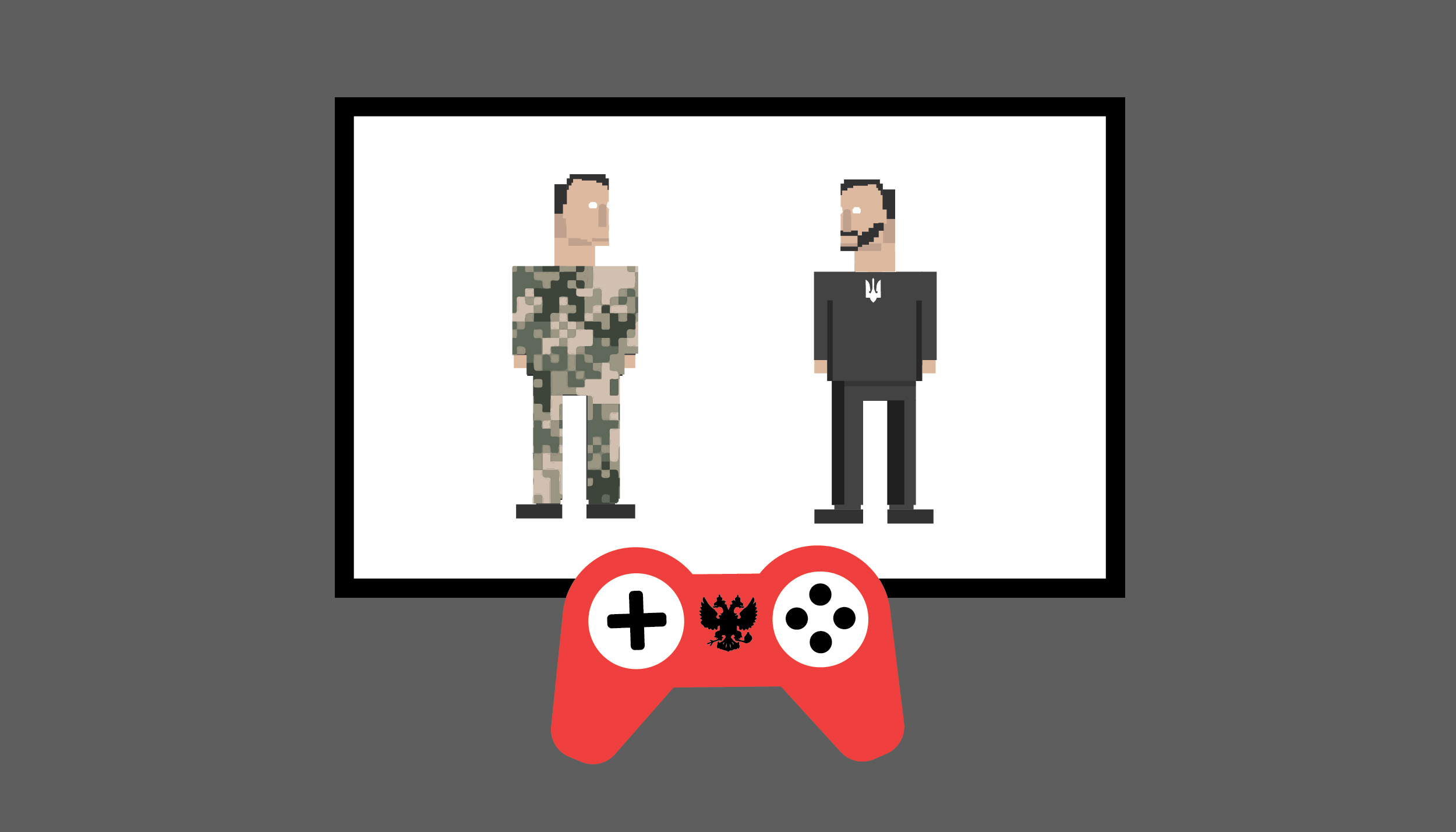Українською читайте тут.
The “escalation” in relations between Ukrainian President Volodymyr Zelenskyy and the Commander-in-Chief of the Armed Forces of Ukraine, General Valeriy Zaluzhnyi, was a major target of manipulation by Russian propaganda last week. On October 30, anonymous sources in the Presidential Office of Ukraine told Time magazine that Zelenskyy “blindly believes” in victory while the counteroffensive “hopelessly failed.” Following this, a column by Valeriy Zaluzhnyi appeared in The Economist, claiming that the battlefield situation had reached a deadlock. Later, Zelenskyy commented that the situation was not that bad and “not a stalemate.”
On the evening of November 7, Volodymyr Ariev, a member of the Ukrainian Parliament from the “European Solidarity” party, wrote on Facebook that Ukrainian Defense Minister Rustem Umerov asked the president to dismiss Zaluzhnyi. Ariev deleted this post 20 minutes later, calling it a mistake. That same evening, a fake video appeared on social media, allegedly showing Zaluzhnyi calling Zelenskyy a traitor and urging the military to march on Kyiv. Russian propaganda seized these opportunities to support their narrative of supposed hostility between Zelenskyy and Zaluzhnyi. We now examine these propagandistic manipulations in detail.
The longstanding narrative of a personal clash between Valeriy Zaluzhnyi and Volodymyr Zelenskyy has been a recurring theme in Russian propaganda, intermittently emerging and fading away. This narrative portrays the Supreme Commander-in-Chief of Ukraine as seeking to replace the Commander-in-Chief, attributing this to Zaluzhnyi’s independent political stance and his higher standing in military circles.
The article by Zaluzhnyi, published in The Economist on November 1, 2023, has been seized upon by Russia as a new pretext to propagate claims of a potential rift between Zelenskyy and Zaluzhnyi. Detector Media specifically delved into the Russian disinformation concerning the general’s assertions. Allegedly, Ukraine has come to realize that it is losing the war, an anonymous Telegram channel was quoted as saying, as the “Russian (Soviet) military school is outperforming the NATO management model.’”
Already this week, Russian propaganda switched to manipulating the narrative around Volodymyr Zelenskyy’s perception of the Commander-in-Chief. Pro-Russian Telegram channels are circulating rumors that the Ukrainian Presidential Office plans to dismiss Zaluzhnyi and appoint someone more aligned with its views.
Prominent pro-Russian blogger Anatoliy Shariy has been spreading false claims that Oleksiy Danilov, the Secretary of the National Security and Defense Council of Ukraine, might be set to replace Valeriy Zaluzhnyi as the Commander-in-Chief of the Armed Forces.
Pro-Russian Telegram channels are also suggesting that not just President Volodymyr Zelenskyy but the head of the Presidential Office, Andriy Yermak, too, are keen on ousting Zaluzhnyi. This purported plan is linked to the general’s alleged refusal to align with Zelenskyy’s team.
A post on one of these channels claimed, “Andriy Yermak has demanded that Zaluzhnyi publicly renounce his political ambitions and become a part of Zelenskyy’s team. The publication of the Commander-in-Chief in The Economist was taken very seriously at Bankova (Presidential Office), leading to the decision to remove his appointee from the post of Commander of Special Operations Forces [on November 3 by Major General Viktor Khorenko stated he found out about his dismissal through the media] as a demonstration of Yermak’s serious intentions.”
Russian propagandists are portraying Zaluzhnyi’s article in The Economist as a defensive move to avoid accountability for any military failures. They assert that Zaluzhnyi, being a military professional, is fully aware of the actual war situation, in contrast to the Presidential Office, which continues to issue only positive reports without critical evaluation or proper conclusions.
The propaganda narrative suggests, “The Commander-in-Chief is not involved in politics; as a military leader, he understands the situation from a strategic standpoint. It is the role of the Presidential Office’s storytellers to feed the public ‘fairy tales’ of imminent victory; Zaluzhnyi’s role, however, is to speak the truth. This is why soldiers respect him, but those at Bankova do not; his independence is a thorn in their side. Hence, Yermak is actively seeking ways to remove him and is systematically purging the army of top generals who are seen as obstacles.”
Another argument put forth by Kremlin propagandists is the tragic death of Major Hennadiy Chastiakov, Assistant to the Commander-in-Chief of the Armed Forces, on November 6. They suggest this was a veiled threat indicating what might transpire if Zaluzhnyi continues to assert his political independence. They allege that Bankova has deliberately kept silent about Chastyakov’s death to evade suspicion.
“The President’s Office issued an instruction to ignore and hush up the death of Zaluzhny’s aide. This topic is considered negative for Bankova, as it triggers disillusionment and fuels the message that this ‘terrorist attack’ could have been organized by characters associated with the Presidential Office,” reads a post from an anonymous Telegram channel.
Ukrainian MP Volodymyr Ariev, on November 7, posted on Facebook claiming to have insider information about discussions concerning Zaluzhnyi’s dismissal at the Supreme Commander-in-Chief’s Headquarters. This information was quickly spread by pro-Russian Telegram channels.
After deleting his post, Ukrainian Defense Minister Rustem Umerov commented that such manipulative actions serve Russian propaganda.
On November 8, the Center for Countering Disinformation (CCD) reported about a deepfake – a fabricated video address of Zaluzhnyi. In this AI-generated video, the Armed Forces Commander-in-Chief supposedly calls for public protests against President Zelenskyy. However, this video has been confirmed as a fabrication.
“Hostile TG-channels are systematically spreading deepfake video addresses of the Commander-in-Chief of the Armed Forces of Ukraine, Valeriy Zaluzhnyi, in which he is falsely portrayed as calling on the Ukrainian population to take to the streets and the military to disobey the ‘criminal orders’ of the government. The Armed Forces Commander-in-Chief did not issue such a statement, nor did he call for a military coup,” clarified the CCD.
Pro-Russian Telegram channels are promoting a narrative that, due to an allegedly botched counteroffensive by the Armed Forces, President Zelenskyy is planning to dismiss Zaluzhnyi. Their claim is that this would achieve two objectives: pinning the blame for the military failure on someone and removing a political rival who enjoys more respect among the Ukrainian military.
“Inside sources understand that such a move would be an act of desperation from Zelenskyy, potentially destabilizing the front and causing division within the army,” is the interpretation offered by Russian propagandists.
Additionally, the propaganda suggests that Zaluzhnyi’s potential dismissal would lead to Ukraine losing further support from the West. According to Russian propagandists, this is another motive for Zelenskyy to remove the Commander-in-Chief.
“Zelenskyy aims to accuse Commander-in-Chief Zaluzhnyi of causing Ukraine to lose Western support and remove him under this pretext, in an effort to eliminate an inconvenient figure from the system finally,” predict the Russian propagandists.
This dissemination of such “insider information” is intended to sow discord and chaos within the Ukrainian leadership. It also serves to persuade the West of the supposed futility of continuing to support Ukraine against Russia’s full-scale aggression. This strategy echoes Russia’s longstanding messaging since the 1990s: framing Ukraine as a “failed state” and “the most corrupt country,” among other derogatory labels.



